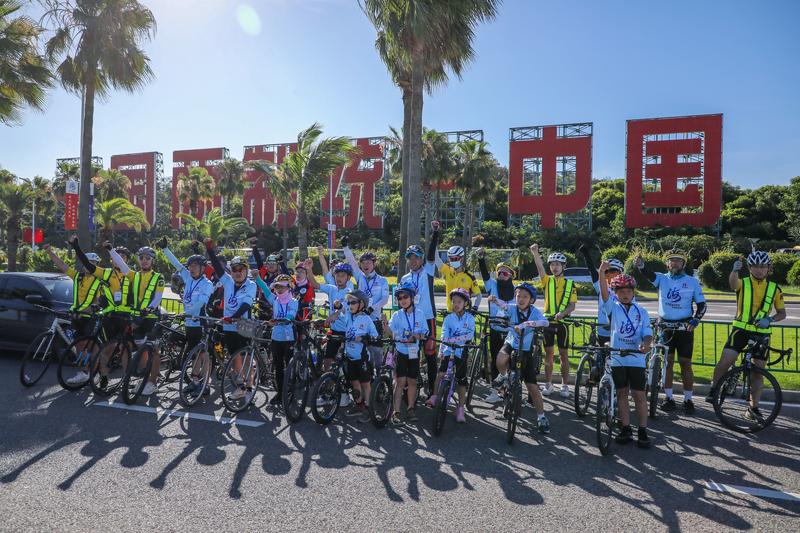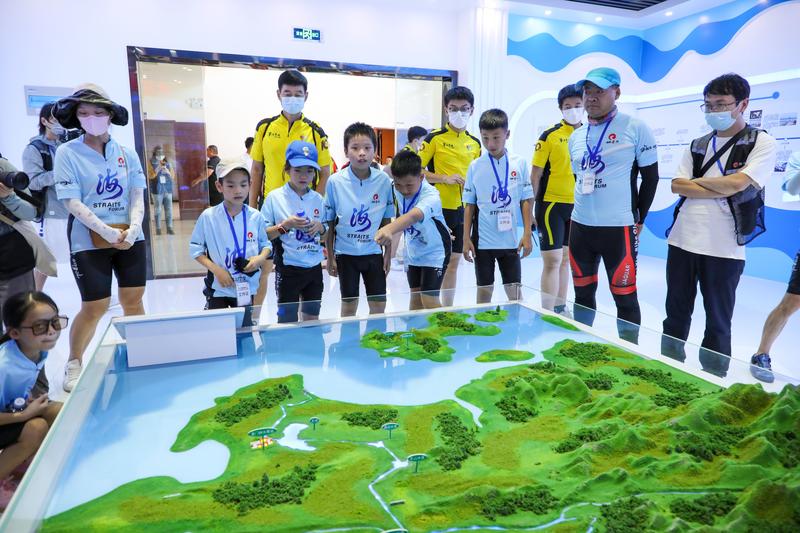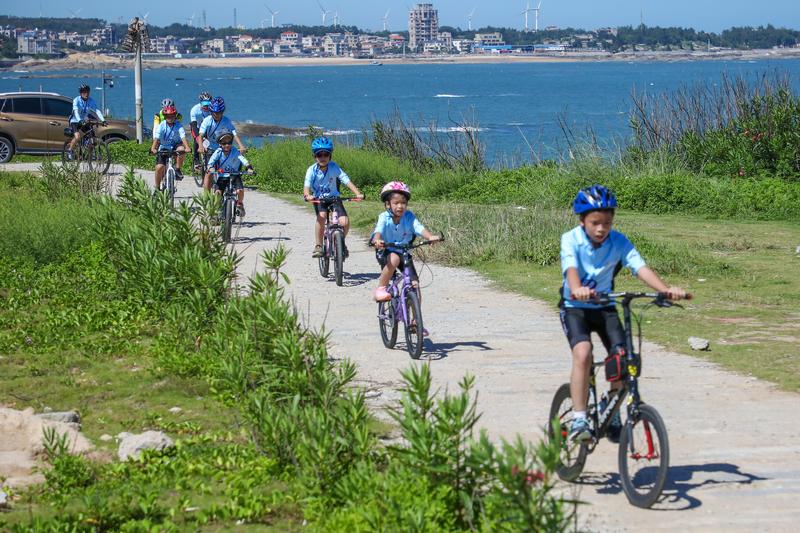Teenagers from Taiwan are benefiting from learning more about the Chinese mainland. Zhang Yi and Hu Meidong report from Xiamen, Fujian.
 A 40-strong cycling team named "Bike Angel", including teenage riders from Taiwan and volunteers from the Chinese mainland, gathers on the ring road of Xiamen Island, Fujian province, in July. (SHEN WEI / FOR CHINA DAILY)
A 40-strong cycling team named "Bike Angel", including teenage riders from Taiwan and volunteers from the Chinese mainland, gathers on the ring road of Xiamen Island, Fujian province, in July. (SHEN WEI / FOR CHINA DAILY)
A 40-strong cycling team named "Bike Angel", including teenage riders from Taiwan and volunteers from the Chinese mainland, toured Fujian, the closest province to the island, last year.
During the two-day summer ride, young people from Taiwan who live on the mainland visited many sites in southern Fujian that have close ties with the island, including a section of an undersea pipeline that delivers fresh water from the coastal province to Kinmen Island.
The ride marked the 10th edition of an annual cross-Straits charity cycle ride started by Taiwan resident Yang Min-chung as a way of helping orphans on the island realize their dream of cycling on the mainland.
In 2011, Yang often traveled to mainland cities as part of his work as a business consultant. However, when he was at home in Taiwan, he regularly visited orphanages to work as a volunteer assistant.
He shared what he had seen on the mainland with the children, piquing their interest. For their part, they were eager to visit the Bird's Nest stadium in the capital after it gained great popularity during the 2008 Beijing Olympic Games.
 The cycling team visits a project that delivers fresh water from Fujian to Kinmen Island. (PHOTO PROVIDED TO CHINA DAILY)
The cycling team visits a project that delivers fresh water from Fujian to Kinmen Island. (PHOTO PROVIDED TO CHINA DAILY)
Keeping a promise
The children loved long-distance cycle rides around the island, which helped build their stamina and confidence, so Yang came up with the idea of taking them to see more of the country via a cycling tour on the mainland.
However, he soon found himself in a dilemma as there were a lot of things to arrange — such as transportation, security and supplies — which made it difficult to organize a cross-provincial group cycling activity on the mainland.
To solve the problem, he registered an account on Weibo, China's Twitter-like platform, and sent his first post, asking if anyone was willing to help arrange the trip.
He received several enthusiastic responses from netizens, the media in Fujian and a couple of companies.
That prompted him to honor a promise he made to some orphaned children in the summer of 2012.
After cycling around Taiwan, Yang took the 35 children to Beijing by plane, and then led them on a ride south to Xiamen in Fujian.
The trip took roughly 40 days, with the children riding about 3,200 kilometers. Buses followed the cyclists, and the children used them if the roads were busy or dangerous, or if the weather was bad.
"It was a great journey, but tough. For the children, cycling was more than a means of transportation: it was a way of realizing self-growth. They accomplished a long-distance ride on the mainland, which many others could not," Yang said.
"The children traveled across the mountains and Straits to see the wider world. They helped each other and formed deep friendships with the mainland volunteers who accompanied them. At the time, many people were willing to support this cross-Straits sporting exchange because it helped disadvantaged youths from Taiwan ride across mainland provinces and learn about the local culture."
The program has continued since then, with participation being expanded to several middle schools in Taiwan, mostly in relatively backward and remote areas.
In the past decade, more than 900 teenagers from the island have taken part in cycling tours in more than 50 mainland cities, covering many thousands of kilometers in total.
 The children ride through Weitou, a small village in Jinjiang, Fujian. (PHOTO PROVIDED TO CHINA DAILY)
The children ride through Weitou, a small village in Jinjiang, Fujian. (PHOTO PROVIDED TO CHINA DAILY)
Maintaining contact
To ensure that the program can continue every year, Yang takes part in the selection of volunteers from mainland universities, choosing about 20 from the hundreds who apply.
Before the COVID-19 epidemic, the chosen volunteers traveled to Taiwan to accompany the students as they cycled around the island for about 10 days, building up mutual trust during the journey. Later, they traveled to the mainland for another 10 days riding in different cities.
Zheng Zetong, a graduate student of medicine at Sun Yat-sen University in Guangzhou, Guangdong province, became a volunteer in 2018, and she made her first visit to Taiwan through the activity.
Recalling the trip, she said that one morning she was tasked with buying breakfast for the whole team, but she was unable to buy enough food because she didn't have enough money.
After learning about the program, the shop owner gave her the extra food for free. "She wanted to thank us for taking Taiwan children to see the wider world," she said.
Zheng said she was also moved by the changes she saw occur in the students and teachers from Taiwan during the journey to the mainland.
She recalled one moment when she focused her camera on an introverted student and was surprised when the youngster beamed back a sweet smile.
"Although it was just a tiny thing, I believe the kids felt the kindness of their older brothers and sisters from the mainland," she said.
After the journey, Zheng kept up with the students via messages from the teachers in Taiwan. "It was heartwarming to receive postcards from Taiwan printed with recent photos of the students and some details about their lives," she said.
"Sometimes, we also received gifts the students had made."
Some of the students later came to the mainland on university exchange programs and a number became volunteers for the program, she said.
In recent years, Zheng has been managing the mainland student volunteers. "Becoming a volunteer in the charity program was attractive to many students because it allowed them to travel to Taiwan and experience cross-Straits exchanges," she said.
Online classes
An online teaching project was launched at the end of 2019 as the team realized that the students used the tenacity they had developed through cycling in their studies, helping them overcome the disadvantages of living in isolated areas and gain entry to good high schools.
The volunteers provide the participating students with extracurricular lessons — including Chinese, English, writing, outdoor sports and cycling skills — throughout the year.
Since 2020, when the cross-Straits cycling activity had to be suspended because of the COVID-19 epidemic, the online teaching program has become the main form of interaction between mainland volunteers and Taiwan students.
Yang and the students rode around the island that summer, while the mainland volunteers, who could not travel to Taiwan, simultaneously helped local students undertake the cycling program in the mountains of Sichuan province.
Chen Binghang, a student at Xiamen University who volunteered for the program in 2020, said although the volunteers are unable to visit Taiwan at the moment, they can communicate and share their feelings with the Taiwan students via online meetings held at night during the dual cycling trip.
Although the team has encountered many difficulties, including unstable online communications caused by network problems, and linguistic differences, the feedback from the Taiwan students shows that they are happy to attend the online classes, he said.
To cultivate the students' sense of beauty and learn more about them, the volunteers have recently developed photographic courses.
"We hope to see the world from their perspective through the photos they take," Chen said.
He added that if conditions permit, they hope the cross-Straits cycling project will return to normal soon so the two sides can meet in person once again.
Contact the writers at zhangyi1@chinadaily.com.cn


